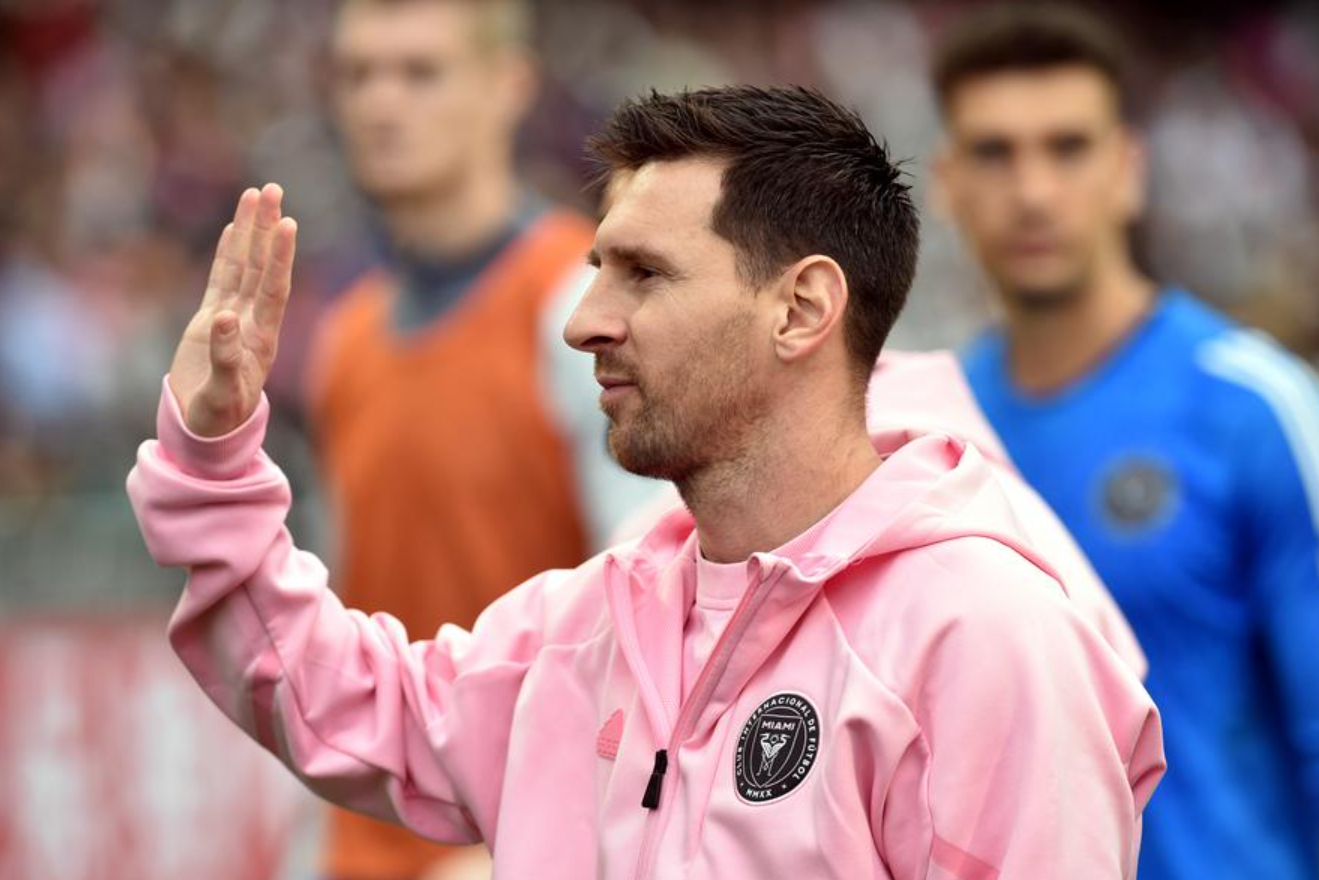Major League Soccer (MLS) is looking to expand its global footprint, with China emerging as a market of interest.
"We welcome more engagement from Chinese fans," said Dan Courtemanche, Chief Communications Officer of MLS, during a briefing on Tuesday at the New York Foreign Press Center in response to a question from Xinhua. "There are certainly a lot of passionate football fans in that country, and we think there's an opportunity there."

Lionel Messi of Inter Miami waves to the crowd ahead of their friendly against a Hong Kong League XI on Feb. 4, 2024. (Xinhua/Lo Ping Fai)
Courtemanche acknowledged that players from China are rarely featured in the league, but he said MLS would like to change that. "We'd love to see more players [from China]," he added, noting that the league currently features players from around 80 countries and regions.
Looking ahead to the 2026 FIFA World Cup, to be co-hosted by the United States, Canada and Mexico, Courtemanche called the tournament "rocket fuel" for the league. 11 of the 13 U.S. host cities are home to MLS clubs.
The league is also looking to invest in the next generation through programs such as MLS NEXT (youth development), MLS NEXT Pro (professional feeder league), and MLS GO (recreational youth football). All of these were launched in the last five years.
"We started because FIFA said, 'You need a Division I league to host the [1994] World Cup,'" Courtemanche said. "Now, 30 years later, we've not only built that league - we've built a football nation."
Courtemanche noted that international engagement is often player-led, though global brands can also play a significant role.
"Generally, it comes through players, but sometimes it comes through big global brands," he said, citing Inter Miami's off-season tour through the Middle East and Asia - led by Lionel Messi and several other international stars - as an example of outreach beyond the Americas.
To reach global audiences, MLS has partnered with Apple TV, which streams matches in more than 100 countries with no blackout restrictions. "My 13-year-old son doesn't watch linear television," Courtemanche said. "He goes to Netflix, he goes to Amazon, he goes to Apple TV, and increasingly, so does much of our audience."
Founded in 1996 as a legacy of the 1994 FIFA World Cup in the United States, MLS has grown from 10 to 30 clubs across the U.S. and Canada. More than 10 billion U.S. dollars has been invested in football-specific infrastructure, with teams moving from oversized American football stadiums to football-specific venues.


 Share:
Share: 




 京公網安備 11010802027341號
京公網安備 11010802027341號 主站蜘蛛池模板:
一级黄色免费毛片|
国产成人一区二区三区精品久久|
中文字幕日韩精品一区二区三区|
最好看的2019中文无字幕|
亚洲欧美日韩国产|
理论秋霞在线看免费|
午夜在线社区视频|
美女视频黄视大全视频免费的|
日本高清不卡在线观看|
亚洲国产香蕉碰碰人人|
波多野结衣护士|
国产国语一级毛片在线放|
jizzjizz丝袜老师|
婷婷久久综合网|
中国特级黄一级**毛片|
校霸把学霸往死里做|
亚洲欧美日韩丝袜另类|
爱我久久国产精品|
免费国产a国产片高清|
精品无码久久久久久久久久|
国产**a大片毛片|
色欲麻豆国产福利精品|
国产伦子系列视频6|
香蕉视频在线免费看|
国产成人无码免费视频97|
JIZZ成熟丰满|
好爽…又高潮了毛片免费看|
一本色道久久88—综合亚洲精品
|
67194在线看片|
成人精品视频99在线观看免费|
久久亚洲国产成人精品性色|
日韩一卡二卡三卡|
久久精品天天中文字幕人妻|
曰韩人妻无码一区二区三区综合部
|
精品少妇人妻av无码久久|
又粗又大又长又爽免费视频|
国产喷水在线观看|
国产欧美精品一区二区三区|
亚洲最大的黄色网|
国产欧美日韩精品a在线观看|
亚洲人成777|
主站蜘蛛池模板:
一级黄色免费毛片|
国产成人一区二区三区精品久久|
中文字幕日韩精品一区二区三区|
最好看的2019中文无字幕|
亚洲欧美日韩国产|
理论秋霞在线看免费|
午夜在线社区视频|
美女视频黄视大全视频免费的|
日本高清不卡在线观看|
亚洲国产香蕉碰碰人人|
波多野结衣护士|
国产国语一级毛片在线放|
jizzjizz丝袜老师|
婷婷久久综合网|
中国特级黄一级**毛片|
校霸把学霸往死里做|
亚洲欧美日韩丝袜另类|
爱我久久国产精品|
免费国产a国产片高清|
精品无码久久久久久久久久|
国产**a大片毛片|
色欲麻豆国产福利精品|
国产伦子系列视频6|
香蕉视频在线免费看|
国产成人无码免费视频97|
JIZZ成熟丰满|
好爽…又高潮了毛片免费看|
一本色道久久88—综合亚洲精品
|
67194在线看片|
成人精品视频99在线观看免费|
久久亚洲国产成人精品性色|
日韩一卡二卡三卡|
久久精品天天中文字幕人妻|
曰韩人妻无码一区二区三区综合部
|
精品少妇人妻av无码久久|
又粗又大又长又爽免费视频|
国产喷水在线观看|
国产欧美精品一区二区三区|
亚洲最大的黄色网|
国产欧美日韩精品a在线观看|
亚洲人成777|